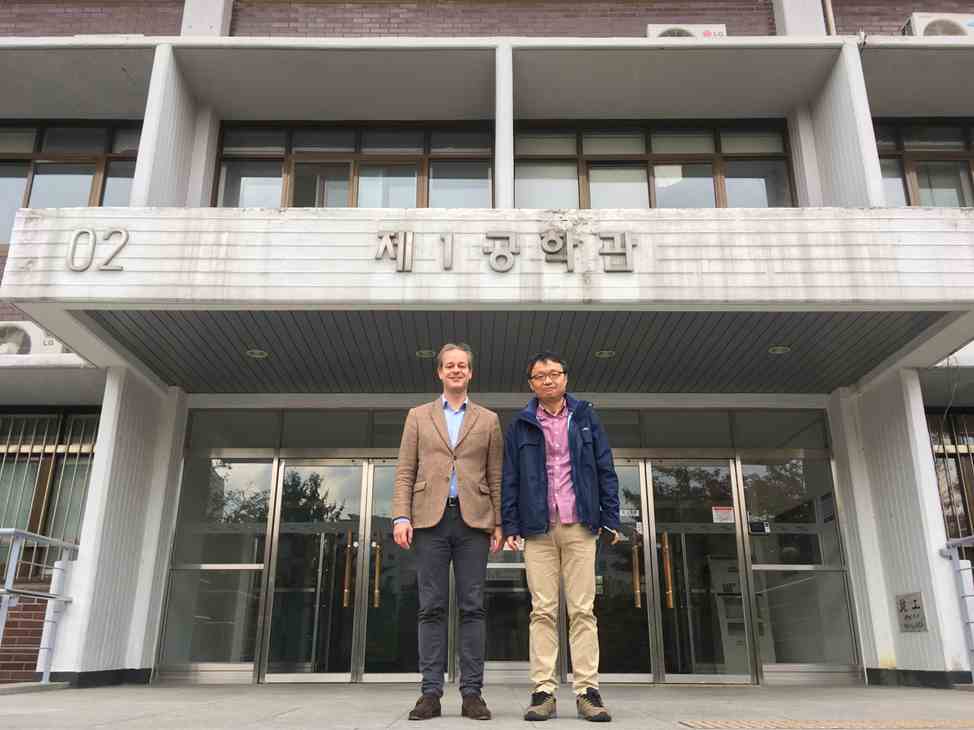Interview with Professor Hyunook Kim, Water-Energy Nexus Editor-in-Chief
Published 16 November, 2017
In November 2017, KeAi’s General Manager, Gert-Jan Geraeds, met with Professor Hyunook Kim at the University of Seoul to discuss the launch of the journal Water-Energy Nexus.
Water-Energy Nexus is an interdisciplinary, community driven, Open Access journal publishing research that addresses the production or management of water and/or energy. Professor Kim is the Founding Editor in Chief of Water-Energy Nexus. Here are some of his reflections on the need for and the unique position of this new journal.

Why the new journal Water-Energy Nexus?
Due to the increasing global population, global water consumption increased from 358 km3/year in the 1900’s to 1500 km3/year in the 2000’s (Kummu et al., 2017). This was an approximately 4.2-fold increase. Over the upcoming 20 years, world water consumption is expected to increase by 85% (IEA, 2012). We need to develop cleaner water resources and supply to meet the demand. As more water is used, more wastewater will be generated that will require treatment. Both water production (water withdrawal or extraction/treatment/distribution) and wastewater management (collection/treatment/reuse or discharge) require energy. A total of 3-4% of all electricity consumed in the US for example is used for water and wastewater infrastructure (EPA, 2013). It is likely that electricity consumption by the water sector will increase in the future.
In 2012, about 100,000 TWh energy was used in the world (IEA, 2014). Total global energy consumption is expected to increase as much as 35% by 2030 (IEA, 2012). A substantial amount of water is consumed during power generation. In 2010, 583 billion m3 water was extracted for energy production, accounting for 15% of the total amount of water withdrawn in the world. Only thermoelectric systems in the US account for 40% of total freshwater withdrawal in the country (IEA, 2014); as such, power generation and cooling processes are important consumers of water. In addition, a significant amount of water or air pollutants are generated or discharged during the process of energy production.
As noted, water and energy are interdependent and very interconnected in our daily lives. They are essential resources in modern life. However, we have limited resources to produce the necessary amounts of power and clean water. Research and new technologies are needed to ensure a continuing adequate supply of these resources.
To address the water and energy challenge, a convergence technology/management approach should be taken. More engineering-oriented approaches should be considered. Water can be produced and supplied at lower energy consumption. Wastewater also can be collected and treated in a more energy-efficient manner, eventually saving significant energy. By the same token, energy can be produced in a more environmentally-friendly way, producing fewer pollutants and using less water.
Water-Energy Nexus is published to provide a space for researchers and engineers to share their practical experience and knowledge and research outcomes in the stated “Water-Energy Nexus Issue” to contribute to building a more sustainable society.
What will be a distinguishing factor for the journal?
As stated, Water-Energy Nexus publishes interdisciplinary and applied research that addresses the production or management of either water or energy or both. In other words, any applied research related to more sustainable water and/or energy use will be published.
This journal does not favor publishing research which reports fragmentary scientific findings from simple laboratory experiments that are not applied to the larger context of water and/or energy production and management.
Why should people submit?
Water-Energy Nexus is the only journal that publishes peer-reviewed articles on the interdisciplinary subject covering both water and energy issues.
It is expected that the global population will be over 9.7 billion in 2050 (UN, 2017). A significant portion of the global population is expected to have insufficient access to water and energy resources; for example, it is expected that more than 4 billion people will experience water scarcity in 2050. Therefore, the water-energy nexus has become an important topic for researchers, engineers, and policy makers. Now, they need a place to share their experience and work together to address these issues. Water-Energy Nexus is the place where scientists, engineers and policy makers will intellectually interact to solve water and energy issues.
As an Open Access journal, its publications will be effectively disseminated to a broad audience of researchers, engineers and policy makers.

